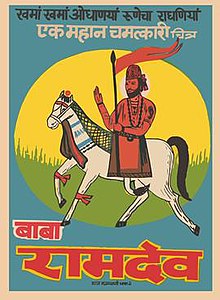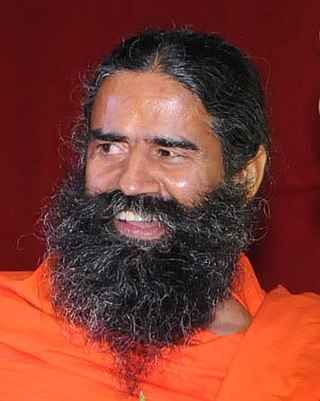
Ramdev, known also by the prefix Baba, is an Indian yoga guru, businessman and brand ambassador for Patanjali Ayurved. He is primarily known for being a proponent of yoga and ayurveda in India. Ramdev has been organizing and conducting large yoga camps since 2002 and broadcasting his yoga classes on various TV channels. He co-founded Patanjali Ayurved and Patanjali Yogpeeth with his colleague Balkrishna in 2006. Ramdev has received criticism over his comments related to modern medicine, yoga, and ayurveda.

Churu is a district of the Indian state of Rajasthan in northern India.

Vijaydan Detha, also known as Bijji, was a noted Indian writer of Rajasthani literature. He was a recipient of several awards including the Padma Shri and the Sahitya Akademi Award.
Rajasthani literature is a tradition in Indian literature dating to the 2nd millennium, which includes literature written in the Rajasthani language. An early form of Rajasthani started developing in the 11th century from Saurseni Prakrit as Maru-Gurjar or Gurjar Apabhramsa. Early Rajasthani literature was usually written by Charans. Earlier Rajasthani was known as Charani or Dingal, which was close to Gujarati. Medieval Rajasthani literature was mostly heroic poetry mentioning the great kings and fighters of Rajasthan. Rabindra Nath Tagore, a Bengali polymath, once said, "The heroic sentiment which is the essence of every song and couplet of a Rajasthani is peculiar emotion of its own of which, however, the whole country may be proud". It is generally agreed that modern Rajasthani literature began with the works of Suryamal Misran, including the Vansa Bhaskara and the Vir Satsai. The Vansa Bhaskara contains accounts of the Rajput princes who ruled in what was then Rajputana, during the lifetime of the poet (1872–1952). The Vir Satsai is a collection of hundreds of couplets.
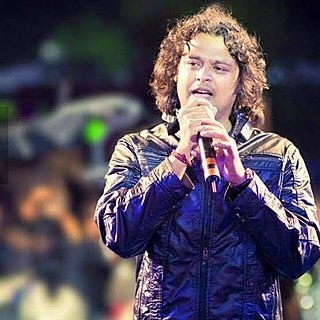
Raja Hasan is an Indian playback singer who was born in December 1982 in the city of Bikaner, Rajasthan, India. He was a finalist on Sa Re Ga Ma Pa Challenge 2007, in which he finished as runner-up to Aneek Dhar. Recently he was a judge in the singing competition show "Voice of Shekhawati".
Bai Chali Sasariye is a 1988 Rajasthani language film. The movie ran for 100 days and thus created a history in Rajasthan cinema.
The cinema of Rajasthan refers to films produced in Rajasthan in north-western India. These films are produced in various regional and tribal languages including Rajasthani and its varieties such as Mewari, Marwari, Hadoti etc.
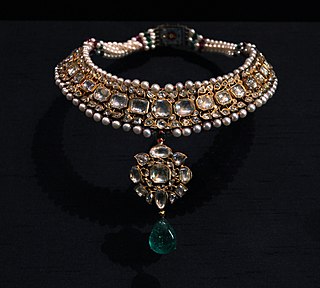
Kundan, meaning pure gold, is a traditional form of Indian gemstone jewellery involving a gem set with a gold foil between the stones and its mount, usually for elaborate necklaces and other jewellery.
Indian ghost movies are popular not just in India but in the Middle East, Africa, South East Asia and other parts of the world. Generally the movies are based on the experiences of modern people who are unexpectedly exposed to ghosts. Some Indian ghost movies, such as the comedy horror film Chandramukhi, have been great hits, dubbed into several languages. They usually draw on traditional Indian literature or folklore, but in some cases are remakes of Western movies, such as Anjaane, based on Alejandro Amenábar's ghost story The Others.

Raj Mandir Cinema is a movie theatre in Jaipur in Rajasthan state in India. Situated on the Bhagwan Das Road, near M.I. Road, the meringue-shaped auditorium opened in 1976, and over the years has seen many movie premieres of Hindi films, and has become a popular symbol of Jaipur. The theatre often referred to as 'Cinema Ka Mandir' is equipped with the latest technology in sound and projection with Dolby Atmos and SLS speakers, the first in the state of Rajasthan. An important landmark and tourist destination, the cinema hall has been accorded the status of largest single screen theatre in Asia.

Sandhya Shantaram known mononyomusly as Sandhya is an Indian actress. She is best known for her appearances in various Hindi and Marathi films directed by her husband V. Shantaram, in 1950s-1960s, most notably Jhanak Jhanak Payal Baaje (1955), Do Aankhen Barah Haath (1958), Navrang (1959), Marathi film Pinjra (1972) and Amar Bhoopali (1951).
Aaj Ka Hindustan is a 1940 Bollywood film directed by Jayant Desai and starring Rose, Prithviraj Kapoor, Ishwarlal, Sitara Devi and comedian Charlie. It was produced by Movietone. The film is the story of two brothers – one a nationalist (Prithviraj).
Neelu Vaghela is an Indian actress, dancer and television personality, well known for her work in the Rajasthani cinema. She is also known for the role of Santosh Arun Rathi aka Bhabho in the soap opera Diya Aur Baati Hum and its sequel Tu Sooraj Main Saanjh, Piyaji on Star Plus. She has her own production house, Aruneel Films, which makes Rajasthani movies.

Bhakta Vidur is a 1921 silent Indian film directed by Kanjibhai Rathod and made under Kohinoor Film Company banner. In this film the Hindu mythological character Vidura was moulded on the personality of Mohandas Karamchand Gandhi. This was the first Indian film to face a ban.
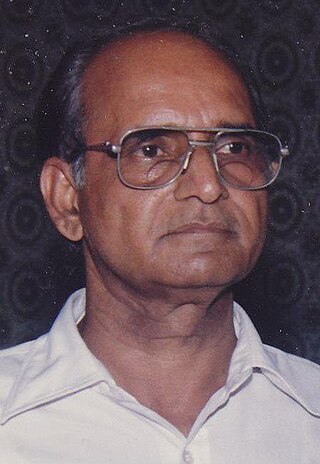
O. P. Vyas was an Indian lyricist, musician, singer and poet from Rajasthan. He wrote primarily in the Rajasthani language and focused on themes of Rajasthani culture.

Mahant Chandnath was an Indian politician and religious leader. He represented the Alwar Seat in the Parliament of India and was also the head of the Nath sect of Hinduism. He took ordination from Mahant Shreyonath in 1978.

Ramayan is a 1954 Hindi religious film based on Valmiki's Ramayana, produced and directed by Vijay Bhatt for Prakash Pictures. The music directors were Shankar Rao Vyas and Hariprasanna Das and the lyrics were written by Ramesh Gupta, Pandit Indra, Neelkanth Tiwari, Baalam Pardesi. The film starred Prem Adib and Shobhana Samarth once again as Rama and Sita. The two actors had earlier acted in a trilogy of Bhatt's films based on the Ramayana, Bharat Milap (1942), Ram Rajya (1943) and Rambaan (1946). All three had been extremely successful, with the audience accepting them in the traditional roles. The other costars included Shahu Modak, Durga Khote, and Umakant.

Ram Rajya is an Indian 1967 Hindi religious film based on Valmiki's Ramayana and directed by Vijay Bhatt. The film was produced by Shankarbhai Bhatt. The music director was Vasant Desai with lyrics written by Bharat Vyas. The cinematographer was Pravin Bhatt and the film starred Bina Rai, Kumar Sen, Badri Prasad, Kanhaiyalal, Farida dadi, Anil Kumar, Jay Vijay.
An awards ceremony where the Cinema of Rajasthani was honored at the Rajasthan Film Festival.
